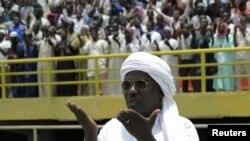The deadline for Mali’s leaders to form a unity government is, once again, approaching, after Interim President Dioncounda Traore set a new cutoff date for this week.
Traore reappointed Prime Minister Cheick Modibo Diarra to head the transitional government on Sunday and confirmed Diarra had 72 hours to form a new government.
One analyst, Susanna Wing, director of Africa Studies at Haverford College in the eastern US state of Pennsylvania called Diarra’s appointment controversial.
“He is a member of the political class, there are a lot of rifts in Mali right now among the members of the political class. There’re many people who don’t trust him,” Wing said.
She said the Economic Community of West African States (ECOWAS), which set a deadline for a unity government of August 10th, has been pressuring Mali to form the government after a coup earlier this year led to a power vacuum that allowed Tuareg separatists to take over northern territory.
Recently, separatists have been pushed out of the northern cities by fundamental Islamist groups who are said to have ties to the al-Qaida terror network.
After a Sunday rally attracted an estimated 50,000 people calling for peace, Wing said one important aspect of the proposed unity government is its diversity.
“What’s critical here is that the participants in the transitional government should come not only from the different sides of the political class, but also civil society members,” she said.
One of the organizers of Sunday’s rally was Mahmoud Dicko, head of Mali's High Islamic Council. “He has been dodging any questions regarding his role in politics,” said Wing, when asked if Dicko might be named in the unity government.
“I would think he would look forward to the elections and possibly running as president…though he has a lot of power and influence in the role he has right now.”
ECOWAS has said it is ready to deploy about 3,000 troops to help restore legitimate rule in northern Mali. Traore has said he will make the request once a unity government is formed.
Traore reappointed Prime Minister Cheick Modibo Diarra to head the transitional government on Sunday and confirmed Diarra had 72 hours to form a new government.
One analyst, Susanna Wing, director of Africa Studies at Haverford College in the eastern US state of Pennsylvania called Diarra’s appointment controversial.
“He is a member of the political class, there are a lot of rifts in Mali right now among the members of the political class. There’re many people who don’t trust him,” Wing said.
She said the Economic Community of West African States (ECOWAS), which set a deadline for a unity government of August 10th, has been pressuring Mali to form the government after a coup earlier this year led to a power vacuum that allowed Tuareg separatists to take over northern territory.
Recently, separatists have been pushed out of the northern cities by fundamental Islamist groups who are said to have ties to the al-Qaida terror network.
After a Sunday rally attracted an estimated 50,000 people calling for peace, Wing said one important aspect of the proposed unity government is its diversity.
“What’s critical here is that the participants in the transitional government should come not only from the different sides of the political class, but also civil society members,” she said.
One of the organizers of Sunday’s rally was Mahmoud Dicko, head of Mali's High Islamic Council. “He has been dodging any questions regarding his role in politics,” said Wing, when asked if Dicko might be named in the unity government.
“I would think he would look forward to the elections and possibly running as president…though he has a lot of power and influence in the role he has right now.”
ECOWAS has said it is ready to deploy about 3,000 troops to help restore legitimate rule in northern Mali. Traore has said he will make the request once a unity government is formed.




